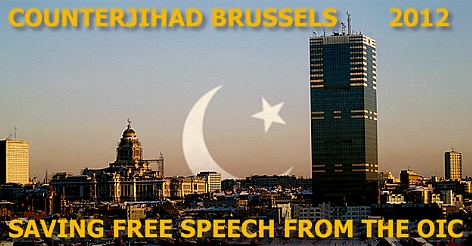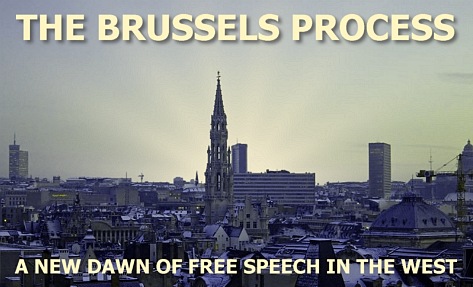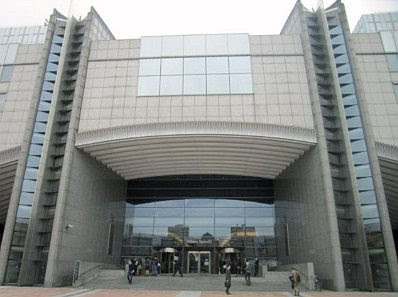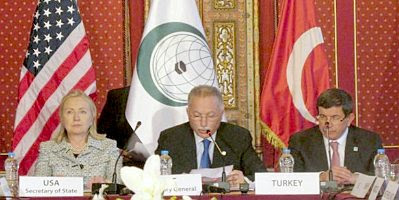
Tell me again about Europe and her pains,
Who’s tortured by the drought, who by the rains.
Glut me with floods where only the swine can row
Who cuts his throat and let him count his gains.
It seemed the best thing to be up and go.
— William Empson, from “Aubade”
The first leg of my flight to Europe last week was a short hop from Dulles to Philadelphia, where I had to endure a five-hour layover before continuing on to Brussels.
Despite all their glitz and hype, airports are not much fun to hang out in for any extended period of time, and Philly is no exception. You can walk for miles through the terminals searching in vain for something interesting to do. You can look at the duty-free booze, or shop for expensive jewelry, or buy a football jersey, or squint at the cover of Rolling Stone in Hudson News, or partake of high-carb delicacies in “Breads ’n’ More”, the generic airport eatery.
I was fortunate enough to find a decent restaurant, one where I could actually sit down and order good food from a waitress. I told the hostess as she ushered me to my table that I was in for a five-hour layover, and she asked me where I was heading.
“Brussels,” I replied.
“Where’s that?” she asked.
“Belgium,” I said. “Actually, it’s the capital of Belgium.”
I wanted to add that it was also the capital of the European Union, but I had a premonition that she would also never have heard of the EU, and I really didn’t want to discover such an appalling fact about this well-dressed, well-spoken young lady. Whether in her ignorance she is representative of her larger American cohort I cannot say.

Counterjihad Brussels Redux
I had the good fortune to spend three full days in Brussels. The first one, Saturday July 7, was what I call “jet lag day”, a 24-hour period of disorientation and stupor during which normal functioning tends to be difficult.
 By Sunday July 8 I was ready for action again. Most of our leadership group was staying in hotels near St. Catherine’s Church, which is not as much of a tourist zone as the area around the Great Market.
By Sunday July 8 I was ready for action again. Most of our leadership group was staying in hotels near St. Catherine’s Church, which is not as much of a tourist zone as the area around the Great Market.The Brussels conference was the following day, so the leadership group — actually a variety of leaders from overlapping Counterjihad networks across Europe — took the opportunity presented by their early arrival, and convened informally that afternoon and evening in various watering holes near St. Catherine’s to discuss issues of common interest to the anti-sharia resistance.
Since most of the people there were involved in the following day’s conference in the European Parliament, much of the talk revolved around the planning for that event.
There were, however, other topics on the agenda. They included:
- The expansion of repression (both official and informal) in Europe, Canada, and the United States against critics of sharia and Islamization
- The formation of new political parties and coalitions, and the redirection of existing parties, to concentrate on resisting the encroachment of sharia
- Planned legislative initiatives in various countries that aim to reaffirm the commitment to individual freedoms specified in our constitutions, which all contradict the tenets of Islamic law
- Strategies for dealing with official resistance to the attempts of individuals and groups to reassert their fundamental rights under their constitutions (or, in the case of Britain, under the English Common Law)
- Practical methods for coordinating our collective resistance to sharia, both internationally and among different groups within a given country
The more general discussion focused on the crackdowns against free speech that are now underway in most European countries. I was already familiar with oppressive conditions in Sweden, Norway, Finland, and Britain, but had not realized how dire the situation is in France, and — to a somewhat lesser extent — in Germany and Switzerland.
When we convened in Brussels five years ago, there had been virtually no prosecutions of Islam-critics in Europe. Since then there have been dozens, and possibly even hundreds, if all the “religiously aggravated public order offences” in Britain are taken into account. The repression is huge, it is ongoing, and it is accelerating.
On that ominous note, we adjourned for the night. The next day we were to take up the same themes in more detail at the European Parliament.

The Brussels Process
On Monday July 9, a much larger group (over a hundred people) gathered in an auditorium of the European Parliament to discuss free speech, civil liberties, the OIC, and what has become known as the “Istanbul Process”.
We assembled beforehand in the Place du Luxembourg in front of the monumental fascist edifice of the Altiero Spinelli Building in the core of the EU complex in central Brussels. When everyone was present, we had to pass through security in the building’s lobby before being ushered to our meeting room.

(Photo credit: Politically Incorrect)
The fascist architecture was all around us. The message of all those huge, impersonal, ugly buildings seems to be: “You puny worm! How dare you think that your individual existence holds any value? This is the State, and you must submit to it!”
Or: “I am Oz, the Great and Powerful!”
The auditorium itself was a somewhat more congenial environment. It was familiar to me from our earlier conference back in 2007, which was held in the same room.
When I sat down at the podium that morning, I saw a lot of familiar faces — people who were at Counterjihad Brussels 2007, and other colleagues I’ve gotten to know since then — as well as a host of new faces, many of them from Germany, France, and Switzerland.

(Photo credit: Politically Incorrect)
By holding our conference in the capital of the European Union, we became vulnerable to the automatic distaste that most ordinary Europeans experience when they contemplate the oppressive unelected behemoth that squats there in the heart of Brussels.
As Durotrigan remarked earlier today, “As a rule of thumb, anything political with ‘Brussels’ in the title sets alarm bells ringing.”
So what is to be done?
In order to change the illiberal, multicultural, and totalitarian associations of the word “Brussels”, a re-branding of the word is necessary. What if Brussels were to become associated with freedom of speech, individual liberty, respect for national sovereignty, and all the other concepts and characteristics that are anathema to the current rulers of the European Union?
This ambitious re-branding project began with the Brussels Declaration, a resolution designed to stand in contrast to the 1990 Cairo Declaration of Human Rights in Islam. By presenting our politicians and their media cheerleaders with the stark facts — that Islamic law violates the central precepts of both individual liberty and human rights as the West understands them — we intend to shine a light on the betrayal of our nations by the elites who govern them.
Last Monday we also launched an ongoing initiative known as the Brussels Process, which stands as a counterpoint to the Istanbul Process.

The Istanbul Process began a year ago today, at the “Organization of the Islamic Conference High-Level Meeting on Combating Religious Intolerance” in Istanbul on July 15, 2011. Secretary of State Hillary Clinton’s remarks on that occasion are worth noting:
For our part, I have asked our Ambassador-at-Large for Religious Freedom, Suzan Johnson Cook, to spearhead our implementation efforts. And to build on the momentum from today’s meeting, later this year the United States intends to invite relevant experts from around the world to the first of what we hope will be a series of meetings to discuss best practices, exchange ideas, and keep us moving forward beyond the polarizing debates of the past; to build those muscles of respect and empathy and tolerance that the secretary general referenced. It is essential that we advance this new consensus and strengthen it, both at the United Nations and beyond, in order to avoid a return to the old patterns of division.
The Human Rights Council has given us a comprehensive framework [i.e. Resolution 16/18] for addressing this issue on the international level. But at the same time, we each have to work to do more to promote respect for religious differences in our own countries. In the United States, I will admit, there are people who still feel vulnerable or marginalized as a result of their religious beliefs. And we have seen how the incendiary actions of just a very few people, a handful in a country of nearly 300 million, can create wide ripples of intolerance. We also understand that, for 235 years, freedom of expression has been a universal right at the core of our democracy. So we are focused on promoting interfaith education and collaboration, enforcing antidiscrimination laws, protecting the rights of all people to worship as they choose, and to use some old-fashioned techniques of peer pressure and shaming, so that people don’t feel that they have the support to do what we abhor. [emphasis added]
The launch of the Istanbul Process was an enormous success for the OIC, the culmination of decades of patient lobbying efforts, unctuous persuasion, and veiled threats aimed at Western governments and international organizations by OIC operatives.
Most Westerners do not realize that the discussion of Islam in the public forums of the West is already regulated by the tenets of sharia, as described in the Koran and the Sunna of the Prophet and codified in the four principal schools of Islamic law. This application of sharia in the West accords with the repeated demands of the Organization of Islamic Cooperation (OIC) as promulgated through resolutions at the United Nations. The behavior of the media, the academy, and Western political leaders closely follows the strictures against the “defamation of religions” as laid down by the OIC.
As is often the case with Islam, common English phrases such as “human rights” and “defamation of religion” mean something different to the Muslims of the OIC than they do to non-Muslims.
The founding document of the Organization of the Islamic Conference (now the Organization of Islamic Cooperation) is its Charter [pdf], which states in Article 15:
The Independent Permanent Commission on Human Rights shall promote the civil, political, social and economic rights enshrined in the organisation’s covenants and declarations and in universally agreed human rights instruments, in conformity with Islamic values. [emphasis added]
So what “universally agreed human rights instruments” are referenced here? One might assume that the OIC is referring the Universal Declaration of Human Rights, but one would be wrong.
The OIC considers the UDHR inadequate and un-Islamic. To codify the human rights of Muslims, the OIC created the Cairo Declaration on Human Rights in Islam, commonly known as the “Cairo Declaration”. It is a formal legal instrument put together by the OIC on behalf of OIC member states in 1990, and was formally served to the United Nations in 1993.
Article 22 of the Cairo Declaration states:
(a) Everyone shall have the right to express his opinion freely in such manner as would not be contrary to the principles of the Shari’ah. 1. Everyone shall have the right to advocate what is right, and propagate what is good, and warn against what is wrong and evil according to the norms of Islamic Shari’ah. (c) Information is a vital necessity to society. It may not be exploited or misused in such a way as may violate sanctities and the dignity of Prophets, undermine moral and ethical Values or disintegrate, corrupt or harm society or weaken its faith. (d) It is not permitted to excite nationalistic or doctrinal hatred or to do anything that may be an incitement to any form or racial discrimination. [emphasis added]
This is a clear statement of the doctrinal limitations imposed on free speech by Islamic law. Speech may not “violate sanctities and the dignity of Prophets”, nor may it create “doctrinal hatred”. Above all, it must “not be contrary to the principles of the Shari’ah”.
In case anyone has any doubts, Article 24 tells us “All the rights and freedoms stipulated in this Declaration are subject to the Islamic Shari’ah”, and Article 25 says, “The Islamic Shari’ah is the only source of reference for the explanation or clarification of any of the articles of this Declaration.”
I guess that settles it.
Each term in Article 22 is carefully chosen to reflect a specific provision of sharia. At first glance, much of what is written there may seem innocuous to non-Muslims. However, a closer examination of Islamic law reveals meanings that are in direct conflict with the UDHR, the United States Constitution, and human rights as they are generally understood by Westerners.
Most importantly, these rules do not apply to Muslims only — they must be obeyed by everyone, Muslim and non-Muslim alike. Hence the OIC’s outreach to the UN, and beyond that to individual Western nations, in an attempt to impose its definition of religious defamation on the rest of the world.
The OIC is now more than halfway through a ten-year program designed to eliminate “Islamophobia” in the infidel world. To that end it established the Islamophobia Observatory, and every year the Observatory issues a report with its findings and recommendations. The “Fourth OIC Observatory Report on Islamophobia” [pdf], covering the period from May 2010 to April 2011, included the following ominous passages:
- Approaches like applying the ‘test of consequences’ were useful and would have to be explored/refined further in an objective fashion towards evolving a consensus with regard to effectively addressing the matter; and
- As regards the issue of freedom of opinion and expression, the OIC could with the views of Special Rapporteur on Freedom of Opinion and expression with regard to making “very few exceptions” but the contours of such exceptions would have to be identified. OIC believed that unfortunate and outrageous episodes like the caricatures and the burning of holy Quran merited the grant of such exceptions; [emphasis added]
This is the heart of the matter.
The Cairo Declaration insists that there must be exceptions to the right of free speech — hopefully “very few” — when defamation of Islam or the prophet is the issue. Most European countries, under the benevolent guidance of the EU, have already fallen into line on this requirement, as evidenced by the state prosecutions of Geert Wilders, Elisabeth Sabaditsch-Wolff, Lars Hedegaard, Jussi Halla-aho, Michael Mannheimer, and numerous others.
The USA remains a stubborn holdout, thanks to an annoying little piece of paper known as the First Amendment of the United States Constitution. One of the primary goals of the OIC is to find a workaround for this problem, and the “test of consequences” may be the solution it has been looking for.
The idea is that the intent of the speaker and the meaning of what he says would no longer be the only issue. The judicial system would also be required to take the likely “consequences” of his speech into account when determining whether he is engaging in a form of protected expression. If he writes an article, performs a song, or draws a picture that is likely to anger a group of people and make them riot, then that is a consequence of his actions, and would justify restrictions on those particular instances of expression.
If the United States could be persuaded to adopt this test — supplementing the more familiar standard imposing a “test of content”, which covers incitement and so on — then the OIC could implement its plan and eliminate “Islamophobia” in America without ever having to amend the Constitution or change any existing laws.
If the “test of consequences” can be slipped into American judicial precedent, the OIC will be well on the way to realizing its most important goals. And the blueprint for the implementation of the OIC’s program can be discerned from Mrs. Clinton’s carefully-chosen words. The United States will undertake “implementation efforts” providing “a comprehensive framework” to address the problem of “incendiary actions” (i.e. speech that defames Islam) that generate “wide ripples of intolerance”. Those “ripples” are the consequences for which the “incendiary actions” of the “Islamophobes” will be tested.
Our Secretary of State is shrewd enough to realize that implementation of the OIC’s standards cannot be accomplished just yet. First there must be “peer pressure and shaming” — that is, people who criticize Islam must be put beyond the pale.
Over the past year we have seen the Istanbul Process at work, both formally and informally. What I say now, and what was said on July 9 in Brussels, is systematically being excluded from polite discourse. Our opinions are stigmatized, shunned, and made unthinkable.

The Brussels Process was initiated under the sponsorship of the International Civil Liberties Alliance, but it is expected to be expanded and extended by any number of other groups on both sides of the Atlantic (and in Australia and New Zealand, for that matter) sharing the same broad principles and goals. There will be numerous future events as a part of the process, some of them involving ICLA, and others completely separate from it.
It’s a big tent. If your organization is focused on civil liberties and freedom of speech, then you are already in the crosshairs of the OIC — which means you are also part of the Brussels Process.
Next time we return to Brussels, we will surely be too numerous for that cozy auditorium in the Spinelli Building. It will be standing room only.
Or perhaps we will need a larger space — say, on the floor of the European Parliament itself.
But as to risings, I can tell you why.
It is on contradiction that they grow.
It seemed the best thing to be up and go.
Up was the heartening and the strong reply.
The heart of standing is we cannot fly.

Previous posts about the Brussels Process:

9 comments:
Excellent and informative post.
Thank you for this info.
Thank you for your good work. It is much appreciated by those of us who have the ability to open our eyes.
Paris Claims
Loads of information, thank you.
Yes, in Finland. Jussi Halla-aho and James Hirvisaari and Freddy Van Wonterghem.
They talk about islam and intellectuals are not happy.
Finnish lurker
It's still hard to believe that a brilliant lawyer like Hillary Clinton, having served as first lady, would accede to this trampling of the US Constitution.
Perhaps she and her husband have long been in thrall to the contributions of the Saudi oil barons, explaining the vicious war against the Bosnian Serbs. Or, perhaps the endemic corrupt practices following her and her husband have permanently skewed her political instincts to following money and influence, ignoring principle.
The political process itself, along with the electorate, has been dumbed down to the extent that a real in-depth discussion of freedom, such as this article, would probably be a liability to the sales of a newspaper or magazine. It is unbelievable that we have ballots printed in Spanish, since a voter unable to read English is almost by definition unable to adequately understand any discussion of issues.
But, I'm still mystified how someone with real legal training and a background of real government service can so eagerly participate in the trampling of the constitution.
Freedom of speech may be the most important issue of this decade. Either we will all be under the constraints of the OIC/Cairo Declaration/Sharia Law or we will enjoy the protections enshrined in the U.S. First Amendment. Freedom of speech MUST include the right to say things that are unpopular -- othewise we will all exist in a Orwellian group-think environment devoid of thought or innovation. Keep up the good work.
Glad to see this initiative!
On The Sharia Cairo Declaration, I would like to point out one element which I have the impression is being pushed far beyond any limits, being "the right to asylum anyhwhere".
Since this "right" is based on sharia, it should be clear that islam and their "scholars" acknowledge no man made borders, and only "one nation", the ummah, which, following their ideology, gives any muslim "the right" to go anywhere and to be treated to "any other muslim rights" at wherever place he chooses.
What we are seeing in the West today, is that our states seem more and more, to be based on this sharia right. Muslims are moving to our countries, they get housing and benefits the locals can never dream of getting, for free.
Anti-sharia movement is a good thing. Then they can't accuse anyone of "islamophobia" or "racism".
“Since then there have been dozens, and possibly even hundreds, if all the “religiously aggravated public order offences” in Britain are taken into account.”
Scotland IMHO has the most oppressive hate crime laws of all the Western democracies - Hate Crime in Scotland 2011-12.
Jolie Rouge
Post a Comment